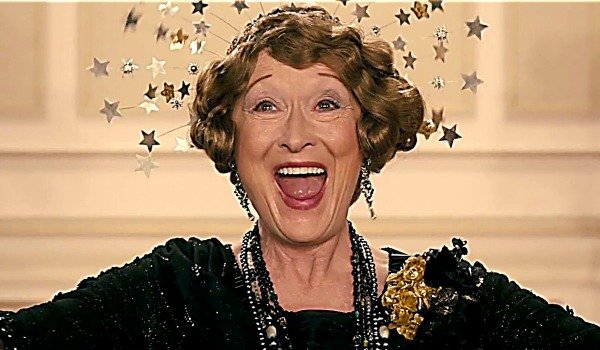Meryl Streep is a goddess. Anyone who doesn't think so is quite simply wrong on a monumental scale. But, the thing is, we've become so accustomed to moments of greatness from the actress that it's easy to overlook her repeated updates to her astounding oeuvre.
Anyone looking for their love of Meryl Streep to be rejuvenated need look no further than Florence Foster Jenkins. The latest example of her monumental prowess in front of the camera sees Streep portraying the world's worst ever opera singer, who is seemingly oblivious of just how awful she sounds. Based on the woman of the same name, Florence Foster Jenkins was the owner of a music club who lives and adores everything about music. She decided to become an opera singer, despite the fact that she couldn't carry a tune. Thanks to the canny approach of her husband/manager St. Clair Bayfield (Hugh Grant), and her own hard work and riches, Jenkins' popularity increases, though, much to the bewilderment of those close to her.
Because of her wealth and blatant shortcomings, Florence Foster Jenkins could easily come across as a petulant, ignorant, spoiled shrew or, less harshly, just an annoying grandmother. But with Streep at the helm of this unusual role, you find yourself slowly falling for her. That's partly because of the joy and fun that Streep is obviously having in the oddball role is so infectious, as she revels in comedically contorting her face and singing outlandishly out of tune. At times, Streep seemingly creates laughs out of thin air, before then immediately grounding the film again in the next moment with just a look. Yet, Streep somehow doesn't let the character's inability override Jenkins' drive, professionalism and human yearning for respect, which makes it all the more heartbreaking that she doesn't have the talent to back-up her obvious knack for impressing her increasing audience, most of whom mistake her awful singing for a comedy routine.
Streep is assisted ably in making Florence Foster Jenkins so watchable by stellar supporting work, too. Firstly from director Stephen Frears, whose own CV is almost as impressive as Streep's. And while Florence Foster Jenkins doesn't rival the power and weight of his greatest cinematic endeavors (My Beautiful Laundrette, Dangerous Liaisons, High Fidelity) his economical storytelling and direction keeps it frothy and infectious.
With the help of the engrossing performances and consistently gentle comedy, Frears guides and pushes audiences without allowing the mechanics of its plot to become overt. At the same time he makes sure that there's absolutely no fat to the film. And because of his understated and tasteful direction, Florence Foster Jenkins constantly moves forward with each scene seamlessly building into the next, culminating with a final act that teeters close to being too over the top, but is sold so well that, like with Florence herself, you're able to brush off and forgive its eccentricities.
It's also great to see Hugh Grant provided with a role that reminds us there's more depth beyond his still-intact good looks. While he's undoubtedly aged, this only helps to add desperation to Grant's portrayal of Florence's plate-spinning husband and manager, who always just gets away with appearing to be in control. Like many of Hugh Grant's characters, he is constantly endearing, despite repeatedly acting in a dastardly and untoward fashion.
Even Simon Helberg, who I thoroughly expected to struggle against the acting heavyweights he goes up against, provides an eccentric but still measured and well-rounded performance as Florence's conflicted young pianist Cosme McMoon, There's a hint of TV sitcom about his jokes, but they're more restrained than his Big Bang Theory appearances, and actually work well with the genial story. And as Frears always manages with even the smallest of roles that are given to agile acting talent, both Rebecca Ferguson and Nina Arianda also chime in with meaningful contributions despite their brief screen-time, too.
Your Daily Blend of Entertainment News
While Florence Foster Jenkins is ultimately too lightweight a story to demand excess celebrations, it's so ravenously feel-good and lovingly told, while also enchantingly evoking ritzy New York during the height of the Second World War, that you'll still be smiling with, and definitely not at, it hours after you've left the cinema.
While refreshingly jolly and funny enough for you, your mother, and grandmother to adore, Florence Foster Jenkins is also subtly touching and surprisingly profound in its positive look at celebrity and fame. It hints at a dark underbelly, too, with affairs, endless mocking, and illness, which smartly never truly come to the fore but still leave an impression. In the end, though, Florence Foster Jenkins is a celebration of failure and awfulness, and how success in any form is complex and dirty.


